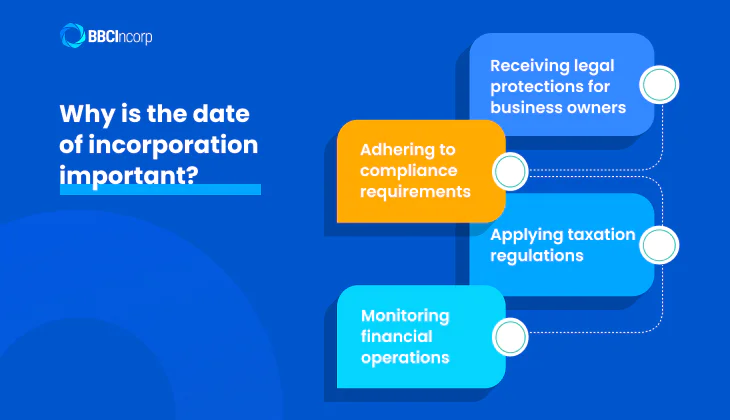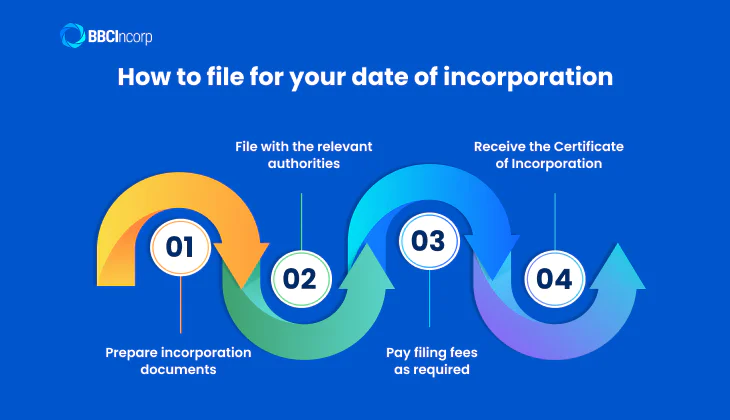
Table of Contents
Every business has a starting point: the moment when an idea transforms into a recognized legal entity. This milestone is known as the date of incorporation. Apart from being an obligation required by the authority. Furthermore, it shapes a company’s legal rights, tax obligations, and strategic opportunities.
In many jurisdictions, government agencies, investors, and financial institutions use this data to assess compliance, credibility, and business longevity. Annual filings, tax returns, and even shareholder meetings are scheduled based on the decision.
But what exactly is the meaning of the date of incorporation, and why does it matter so much? Let’s break it down in today’s article.
What is the date of incorporation and why is it important?
Definition of the date of incorporation
The date of incorporation is the official moment a business becomes a distinct legal entity, separate from its founders. This occurs upon the successful filing and approval of incorporation documents, such as the articles of incorporation, with the relevant governmental body.
From then, the company gains legal recognition, allowing it to operate, enter contracts, and enjoy protections under corporate law.
Why is the date of incorporation important?
What implications does the incorporation date carry across various aspects of business operations? We’ll examine the resulting rights and obligations right below.

Receiving legal protections for business owners
Starting the incorporation date, a company is formally recognized as an entity under the law. Specifically for Limited Liability Company (LLC) owners, this structure generally offers limited liability protection and personal assets are shielded from business debts and obligations.
If you form your LLC in the United States, your personal assets are not at risk if the company faces legal issues. Nevertheless, you must maintain proper separation between personal and business finances to uphold this protection from the business established date.
Adhering to compliance requirements
The company incorporation date sets the clock for various compliance requirements. Many jurisdictions mandate that companies adhere to specific laws and regulations enacted by federal, state, and local governments. These requirements often include annual reporting and timely filings for maintaining good standing and avoiding penalties.
Applying taxation regulations
Upon incorporation, a company must follow the taxation rules that apply to its model, and the date of incorporation is key to determining its tax obligations.
In the United States, for example, corporations are required to file an annual tax return (generally Form 1120) by the 15th day of the fourth month following the close of their tax year. This timeline is directly influenced by the inc date, which then establishes its fiscal year and subsequent tax deadlines.
Monitoring financial operations
Proof of incorporation is universally a prerequisite for banks, financial institutions, and investors when considering business relationships, or capital provision. The document assures them of the company’s legitimacy and compliance with legal standards, thereby facilitating smoother cooperation and opportunities for global expansion.
In established jurisdictions like the U.S., this proof is commonly a “Certificate of Incorporation” or “Articles of Incorporation” issued by the Secretary of State in the company’s state of formation. In the case of Hong Kong, the Companies Registry issues a “Certificate of Incorporation Hong Kong” with the incorporation date upon successful registration.
Meaning of date of incorporation
What does the date of incorporation simplify?
An enterprise’s date of incorporation meaning is of utmost importance. Legally, it signifies the company’s ability to engage in business activities and establishes the commencement of its corporate existence.
Operationally, the incorporation date often determines the start of financial reporting periods and tax obligations. Strategically, it can influence perceptions of business longevity and credibility among investors and partners.
A common misconception is that the incorporation date can be altered retroactively. However, once established, this date is fixed and cannot be backdated. Attempting to change it retroactively is not permissible and can lead to legal complications.
Date of incorporation vs. other business dates
Successfully navigating the landscape of business requires a clear understanding of the distinctions between various key dates. While the date of incorporation holds a prominent position, other dates often contribute to a company’s narrative.
Date of incorporation vs. date of registration
Date incorporated vs. date established: Are they the same date, and how do they differ?
The date of incorporation represents the precise moment a company achieves legal existence. It is the official record of the company’s formation, establishing its capacity to enter into contracts, own property, and conduct business. This is determined by the filing and acceptance of incorporation documents with the relevant governing body.
The date of registration, in contrast, is a company’s authorization to operate in a specific jurisdiction outside its primary jurisdiction of incorporation. The process, sometimes referred to as “foreign qualification”, is a separate administrative step from incorporation, and is governed by the specific requirements of the registering jurisdiction.
Key milestones in a company’s history
Beyond incorporation and registration, several other dates are frequently referenced:
Date established
This term is often used broadly and can have varying interpretations. The business establishment date may refer to the date of incorporation, the commencement of operations, or another crucial milestone. While commonly used in branding (“Established in 1999”) as a general historical stamp, it lacks legal precision.
Business start date
This date marks the commencement of a company’s core business activities, such as the production of goods, the provision of services, or the generation of revenue.
It represents the point at which the company actively engages in its intended purpose, but the business start date may or may not coincide with the incorporation date.
Founding date
The founding date is the initial conception or organization of the company by its founders, preceding any activities. While a valuable part of the company’s history, the founding date is a sentimental milestone and carries no legal weight.
How to find the date of incorporation for a business?
Locating a company’s date of incorporation is often simple, thanks to the availability of publicly accessible records. Here are some reliable resources to help:
For your own business
The most direct way to find your company’s date of incorporation is by reviewing your original incorporation documents. These could include the articles of incorporation, certificate of incorporation, or similar documents issued by the relevant incorporating authority. You must keep these records in a safe and accessible location.
Additionally, many jurisdictions also offer online access to business records through state business registries or dedicated portals. For example, in Delaware, the Secretary of State’s website provides a searchable database of company information, including the date of incorporation. Similar online portals exist for most U.S. states and many other developed countries as well.
For other businesses
Finding the date of incorporation for other businesses generally involves searching public records. For U.S. companies, the Securities and Exchange Commission (SEC) database is a valuable resource for publicly traded companies. For privately held companies, state-level business registries are the primary source.
Online databases offer another method on how to find the date of incorporation. OpenCorporates is a prominent example. A company’s own website may also list its incorporation date, often in the “About Us” section or legal disclaimers.
Practical steps to take:
- Identify the jurisdiction: Determine the state or country where the business is incorporated.
- Access the registry: Visit the website of the Secretary of State or equivalent agency in that jurisdiction.
- Search the database: Use the company’s name or registration number to search the online database.
- Review the results: The search results should display the company’s date of incorporation.
- Utilize other online databases as alternatives: If state-level searches are unsuccessful, explore online databases like OpenCorporates.
Strategic considerations when selecting a date of incorporation
While legal processes often influence your incorporation date, businesses with flexibility should consider the strategic implications.
Align with fiscal year
For instance, aligning your incorporation date with the start of your fiscal year can simplify accounting and tax filings. This also presents a clear financial picture to potential investors. Some jurisdictions even offer tax benefits for incorporating within specific timeframes. It is advisable to consult with a legal or financial professional to identify these opportunities.
Consider reporting periods
Additionally, you can take into account its impact on financial reporting periods. Choosing a date close to the end of a calendar year might result in a very short first reporting period, potentially affecting early financial analysis.
Refer to a symbolic significance
Businesses might prefer to pick a date with a symbolic value, e.g. the anniversary of a founding event or a date that resonates with your brand identity. While not directly impacting legal or financial matters, this choice can enrich your company’s narrative and brand story.
If your business has a strong connection to a particular date or holiday, incorporating on that day can create a memorable association.
How to file for your date of incorporation
Establishing your company’s incorporation date involves completing the registration process within your chosen jurisdiction. While specific requirements may vary, the general steps to registering a company are as below:

Step 1: Prepare incorporation documents
First is to gather the necessary documents, which typically include:
- Articles of Incorporation: This foundational document outlines essential details about your business, such as its name, purpose, and registered agent.
- Corporate Bylaws: These internal rules govern your corporation’s management and operation, detailing the organization’s roles and responsibilities.
- Operating Agreement: For LLCs, this document outlines the management structure and operating procedures, defining the relationship among members.
- Name Reservation Application: Some jurisdictions require or offer the option to reserve your desired business name prior to filing the Articles of Incorporation.
Step 2: File with the relevant authorities
Then, you need to submit the completed forms to the appropriate governing body in your chosen state of incorporation, such as the Secretary of State. If your jurisdiction allows for future dating or retroactive filing, you may specify your desired date within these documents.
Step 3: Pay filing fees as required
Next, complete the process by paying the required filing fee. In the British Virgin Islands, for example, BVI company setup cost varies based on the number of shares (2023):
- Companies authorized to issue up to 50,000 shares: The incorporation fee is USD550.
- Companies authorized to issue more than 50,000 shares: The incorporation fee is USD1,350.
Please keep in mind that fees for other states and jurisdictions will vary, so you should consult the relevant authority for up-to-date information.
Step 4: Receive the Certificate of Incorporation
Once your application is approved, you will receive your Certificate of Incorporation. With this document, your company’s legal existence is officially established on your incorporation date.
Need assistance with global incorporation?
Navigating the incorporation process can be complex and time-consuming. If you’re seeking expert guidance and efficient solutions, consider leveraging BBCIncorp’s services.
Our team provides support with every step of your company incorporation journey, so you can enjoy a cost-efficient and hassle-free setup. Contact us today for timely assistance.
Conclusion of the article
More than just a date on a document, your date of incorporation is the beginning of your company’s journey. It’s a pivotal moment with ripple effects across legal, financial, and operational aspects of your business. From compliance and taxation to brand storytelling, this date holds a significance that extends far beyond a simple note.
Therefore, accurate records and a thorough understanding of your incorporation date are essential to conquer the complexities of business operations. Armed with this knowledge, you shall leverage opportunities and build a strong foundation for your company’s future.
Don’t hesitate to seek out the support of legal and financial professionals from BBCIncorp. Our team can be reached at service@bbcincorp.com for any inquiries.
Frequently Asked Questions
Is it possible to modify the incorporation date of your company?
Generally, no. The incorporation date is a fixed legal record of your company’s formation. It’s permanently established upon the filing and approval of your incorporation documents.
However, there might be extremely rare circumstances where a change to the official record could be possible:
- Administrative error: If a clerical error occurred during the initial filing, you might be able to petition the relevant authority (e.g., Secretary of State) for a correction.
- Merger or restructuring: Complex restructuring might result in a new “effective date” for a successor entity.
- Reinstatement: If a company was dissolved and later reinstated, there might be a new effective date of reinstatement.
Nevertheless, the original incorporation date always remains part of the company’s history, even if other dates become relevant.
Can you begin trading right after the date of incorporation?
Whether you can start trading immediately after your incorporation date depends on your definition of “trading.”
- Publicly trading securities: No. This requires meeting regulatory requirements and potentially going through an IPO, which takes time.
- General business operations: Potentially yes. Once incorporated, your company can generally engage in business, given that you already have the required licenses.
In the U.K., once registered with the Companies House, you can begin trading operations right away, or remain dormant until a business bank account is available.
How does the incorporation date affect my company's tax obligations?
Here’s how the date of incorporation influences your company’s taxation:
- Fiscal year: Your incorporation date often sets your company’s fiscal year-end, influencing when your tax returns are due and the period they cover.
- Tax rates and incentives: Tax regulations can be changed annually. Your incorporation date determines which tax year your company falls under, and the specific rules that apply, including certain deductions and credits.
What should you consider when choosing an incorporation date?
It’s recommended to consider the following factors:
- Fiscal year alignment: Simplify accounting and taxes.
- Tax benefits: Research potential incentives.
- Reporting periods: Avoid overly short initial periods.
- Symbolic significance: Choose a meaningful date.
- Administrative efficiency: Factor in potential processing delays.
Disclaimer: While BBCIncorp strives to make the information on this website as timely and accurate as possible, the information itself is for reference purposes only. You should not substitute the information provided in this article for competent legal advice. Feel free to contact BBCIncorp’s customer services for advice on your specific cases.
Industry News & Insights
Get helpful tips and info from our newsletter!
Stay in the know and be empowered with our strategic how-tos, resources, and guidelines.





